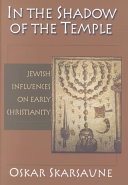










The widespread perception of a decisive "parting of the ways" between Christianity and Judaism after the destruction of the temple in 70 A.D. has distorted our understanding of the following decades and centuries of Jewish and Christian history. We are left with the impression that hostile polemic or mutual avoidance between Christians and Jews was the order of the day.To be sure, there were points of bitterness and strife between these two groups, but the story of their relationship is better told as the relationship between younger and older siblings. In and between the lines of our historical data, there is abundant evidence of interaction between the early church and the ancient synagogue. This took place at the levels of both leadership and laypeople, and it left its imprint on the emerging shape of the church. But this story has not yet fully been told.In the Shadow of the Temple, offers a new perspective on the development of the early church in its practice (e.g., worship, baptism and Eucharist) and doctrine (e.g., Scripture, Christology, pneumatology). Oskar Skarsaune begins by tracing the story of second temple Judaism from the crisis of the Jewish encounter with Hellenism in the second century B.C. through the diverse Judaisms of the first century A.D. Then, from the time of Jesus and the origins of the church up to the Constantinian revolution of the early fourth century A.D, Skarsaune offers us fascinating snapshots and analyses of the interactions, the arguments and the shaping influences of Judaism on the life, creed and practices of the church.This is a book that will both fascinate and inform its readers. Skarsaune embraces a historical period that transcends the ordinay division of labor between scholars of Christian origins and early church history. And he offers insights into history that challenge the prevailing notions of the way it was--and the way it must be--between Christians and Jews.

